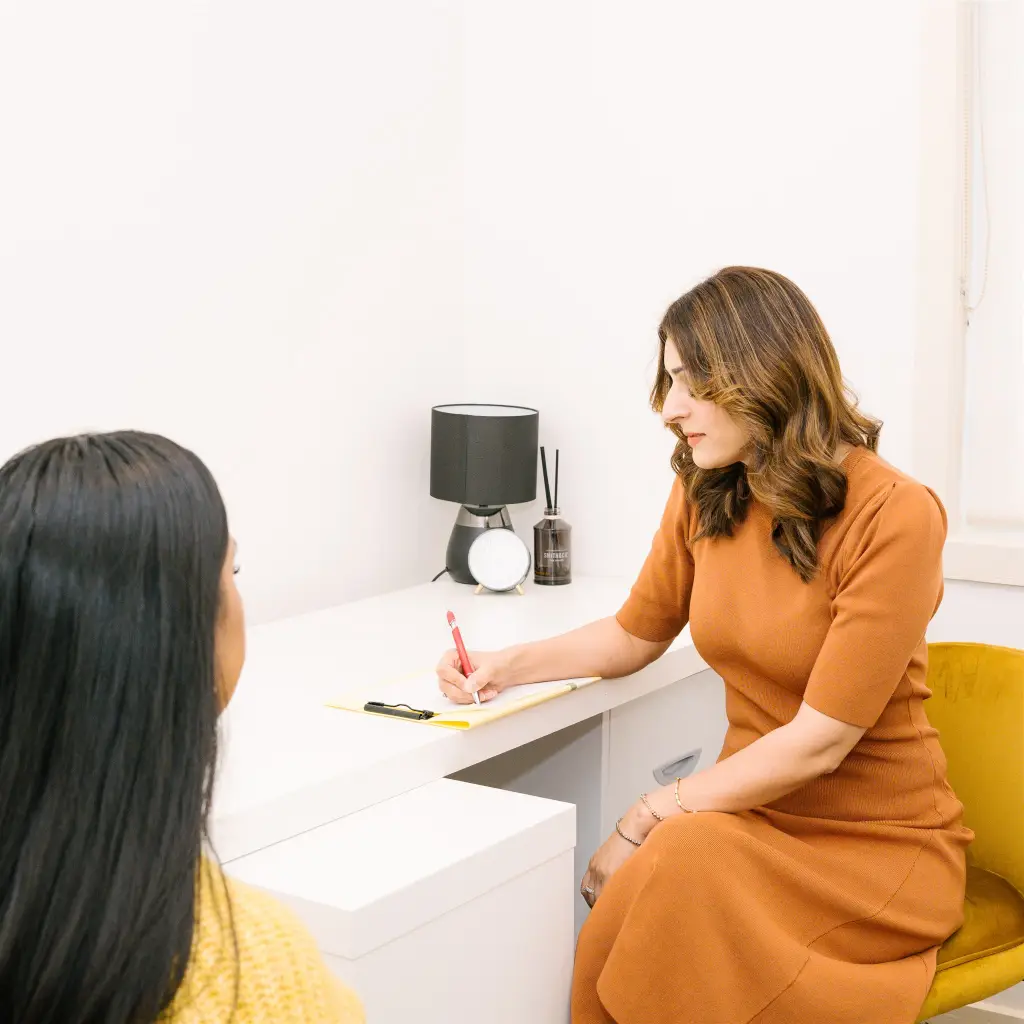Do you often find yourself lost in thought, struggling to stay organized, or feeling overwhelmed by everyday tasks? Many women experience these challenges, but when they persist and impact your life significantly, they could be signs of ADHD—a condition often overlooked in women.
If you’re curious about whether your struggles might be related to ADHD, you’re not alone, and you’re in the right place. In this blog, we’ll explore how ADHD specifically affects women, offer a free self-assessment to help identify the symptoms, and discuss effective treatments and strategies to manage this condition.
Contents
Is It ADHD? Take the Free Self-Assessment
Wondering if the challenges you’re facing could be symptoms of ADHD? Our free online self-assessment is designed to help you identify the signs of ADHD in a way that respects your experiences and privacy.
Click the button below to start the self-assessment now and take the first step towards understanding and managing your symptoms better.
What Is It Like Having ADHD as a Woman?

ADHD in women often goes unrecognized and undiagnosed because the symptoms can differ significantly from the classic presentation seen in men. Instead of the stereotypical hyperactivity, women are more likely to experience internal symptoms that aren’t always visible to the outside world. Understanding these signs is the first step toward getting the help you might need.
Here are key symptoms that are commonly observed in women with ADHD:
- Inattention: You might find it hard to stay focused on tasks, especially routine or repetitive ones. This can manifest as difficulty paying attention during conversations, missing details, and a tendency to daydream.
- Internal Restlessness: While men may exhibit physical hyperactivity, women often experience this as a feeling of being internally restless. You might feel an overwhelming urge to be constantly busy or find it difficult to relax.
- Overwhelm with Daily Tasks: Managing day-to-day responsibilities can feel daunting. Simple tasks like organizing, planning, and completing chores or work assignments can become sources of significant stress.
- Emotional Sensitivity: Emotional dysregulation is a common symptom, leading to mood swings, heightened emotional responses, and feelings of being easily overwhelmed by minor stressors.
- Impulsivity: This might not be as overt as in males; in women, it can appear as spur-of-the-moment decisions regarding spending, commitments, or verbal responses.
These symptoms often lead to challenges such as chronic disorganization, underachievement, low self-esteem, and strained relationships. Because these signs can easily be misattributed to personal faults or other mental health issues like anxiety or depression, many women don’t realize that ADHD might be the underlying cause.
The Impact of ADHD on Women’s Lives

ADHD can profoundly affect every aspect of a woman’s life, often in ways that go unnoticed by others. Understanding these impacts can help in acknowledging challenges and fostering empathy, both self-directed and from those around you.
- Work and Career: ADHD can make it difficult to meet deadlines, manage time efficiently, or maintain focus during meetings, which might hinder career advancement and lead to job dissatisfaction.
- Relationships: Communication difficulties, forgotten commitments, and the inconsistent ability to manage household responsibilities can strain relationships with partners, family, and friends.
- Self-Esteem: Frequent struggles with everyday tasks can lead to feelings of failure and self-doubt. Women with ADHD often report feeling misunderstood, which can exacerbate low self-esteem.
- Mental Health: The challenges of living with undiagnosed or untreated ADHD can contribute to anxiety, depression, and emotional dysregulation. The stress of managing ADHD symptoms on a daily basis can also lead to burnout and mental exhaustion.
Lifestyle Changes to Manage ADHD Symptoms

Managing ADHD doesn’t always require medication—it’s often about making small adjustments in daily life. Here are some simple lifestyle changes that can help reduce symptoms and improve focus:
- Create Structure: Set up a routine with clear goals and specific times for tasks. This helps reduce overwhelm and makes it easier to stay on track.
- Use Reminders: Set alarms, use a calendar, or make checklists to help you stay organized and remember important tasks.
- Exercise Regularly: Physical activity can improve focus and reduce restlessness. Even a quick daily walk or yoga session can make a big difference.
- Prioritize Sleep: Getting enough sleep is crucial for managing ADHD symptoms. Stick to a consistent bedtime and create a calming bedtime routine.
- Mindfulness and Relaxation: Incorporate mindfulness practices, like deep breathing or meditation, to help calm your mind and improve concentration.
- Simplify Your Environment: Declutter your space to reduce distractions and create a peaceful place to work and relax.
- Healthy Eating: A balanced diet rich in fruits, vegetables, and protein can help regulate energy levels and support brain function.
These changes can help you feel more in control of your ADHD symptoms and improve your overall well-being. Small steps can lead to big improvements, so start simple and build from there.
Free Support Is Here!
If you’re struggling with the overwhelming effects of ADHD and just need someone to talk to, MyMindMantra is here to help. Sometimes, all you need is a compassionate listener who can offer support without judgment. Whether you’re feeling frustrated, misunderstood, or simply want to share your thoughts, we’ve got you covered!
Just click the link, download the app, and tap on “Talk with a Listener.” It’s free, easy, and a simple way to take the first step toward feeling heard and supported.
Treatment for ADHD in Women

ADHD treatment for women requires a personalized approach to address the unique ways the condition manifests. Fortunately, there are effective treatment options available that can help manage symptoms and improve quality of life. Here’s a quick breakdown of the most common treatments:
- Medication: Stimulants like Adderall or Ritalin are often prescribed to help manage focus and reduce hyperactive behaviors. Non-stimulant options, like Strattera, may be considered if stimulants aren’t suitable.
- Behavioral Therapy: This type of therapy focuses on teaching coping strategies and improving problem-solving skills. Cognitive Behavioral Therapy (CBT) is particularly effective in helping women address negative thought patterns, build organization skills, and manage stress.
- Coaching and Organizational Support: ADHD coaching can help women create structured routines, manage time more effectively, and build skills to stay organized. Coaches work with you to implement practical strategies for everyday life.
- Lifestyle Adjustments: As discussed earlier, can make a big difference in symptom management.
- Support Groups: Joining ADHD support groups can help women connect with others who share similar experiences. These groups offer emotional support and practical tips from those who truly understand the challenges.
Treatment for ADHD is most effective when it’s tailored to each individual’s needs. If you think ADHD is affecting your life, it’s never too late to start seeking help. Whether through medication, therapy, or lifestyle changes, there are ways to regain control and live a fulfilling life.
Get Professional Help Here!
Dealing with ADHD, especially as a woman, can feel isolating and overwhelming, but you don’t have to navigate this journey alone. Professional support can make a significant difference in managing your symptoms and improving your quality of life.
At Mantra Care, we specialize in providing tailored support to women with ADHD. Our expert therapists are equipped with the tools to help you understand and manage your ADHD, offering strategies that are aligned with your unique needs.
Don’t wait to seek the help you deserve. Visit our website today and book your trial online therapy session. It’s quick, confidential, and the first step toward a more focused and fulfilling life.
